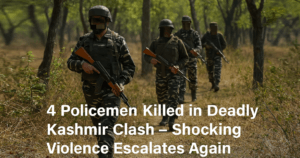4 Policemen Killed in Deadly Kashmir Clash – Shocking Violence Escalates Again
A fierce gun battle in India-administered Jammu and Kashmir’s Kathua district left four police officers and two suspected rebels dead. The violence erupted when a police patrol was ambushed while searching for armed fighters in a dense forest. Security forces later recovered weapons, grenades, and ammunition from the scene. Officials claim the attackers were from Pakistan, though no concrete evidence was provided. The Kashmir conflict, ongoing for over 70 years, remains a major point of tension between India and Pakistan. While violence has declined in recent years, occasional deadly clashes still occur.
The situation worsened after India revoked Kashmir’s special autonomy in 2019, leading to heightened security and restrictions. Prime Minister Narendra Modi has defended this move, vowing that Article 370 will never be restored.

4 Policemen Killed in Deadly Kashmir Clash – Shocking Violence Escalates Again
A violent confrontation in the forested region of Kathua, located in Jammu and Kashmir under Indian administration, resulted in the deaths of four police officers and two suspected rebels. The incident occurred during a security operation targeting armed groups in the area.
Details of the Encounter
According to the Indian Army’s Rising Star Corps, security forces carried out continuous operations over several days, ultimately killing two individuals believed to be militants. Authorities recovered weapons, ammunition, grenades, a bulletproof jacket, and rifle magazines from the site. The clash began on Thursday when a police patrol was ambushed while searching for fighters who had reportedly escaped an earlier security operation. Officials stated that the suspects had been hiding in the dense forest.
Jammu and Kashmir’s police chief, Nalin Prabhat, alleged that the militants involved had crossed into the region from Pakistan. However, no specific evidence or further details were provided to support this claim.
Background of the Conflict
For over seven decades, Jammu and Kashmir has been a flashpoint in the ongoing rivalry between India and Pakistan. Both nations claim the region in full but control only parts of it. Armed groups in the area have long fought for either independence or unification with Pakistan, resulting in decades of violence. While clashes have decreased in recent years, sporadic incidents persist. Official data shows that at least 14 security personnel were killed in similar confrontations in the first half of 2024, following 30 fatalities in 2023.
India has repeatedly accused Pakistan of providing training, weapons, and financial support to militant groups in Kashmir—a claim Pakistan denies. Islamabad maintains that it only offers political and diplomatic backing to Kashmiris seeking self-determination, as outlined in United Nations resolutions.
Rising Tensions Since 2019
The region’s instability worsened in August 2019 when India’s central government revoked Article 370 of the constitution, stripping Jammu and Kashmir of its semi-autonomous status. The move, defended by Prime Minister Narendra Modi as a step toward national integration and development, triggered widespread outrage among locals. Critics argue that the decision undermined Kashmir’s identity and democratic rights, deepening distrust toward Indian authorities.
Following the revocation, the government imposed severe restrictions on civil liberties, including internet shutdowns, curfews, and limits on public gatherings. Journalists and activists have reported increased surveillance, censorship, and obstacles to political expression. Security forces remain on high alert, with frequent military operations and checkpoints throughout the region.
Political Reactions and Future Implications
Prime Minister Modi has consistently justified the repeal of Article 370, asserting that it has brought “peace and progress” to Kashmir. During a recent speech, he stated, “No power in the world can restore Article 370,” reaffirming his government’s stance. However, local leaders and residents paint a different picture, citing rising unemployment, infrastructural neglect, and a growing sense of alienation.
The latest clash underscores the fragile security environment in Kashmir. While Indian officials highlight a decline in militancy-related incidents, the continued loss of lives—both security personnel and civilians—fuels ongoing tensions. Families of the slain officers have demanded stricter action against militants, while human rights groups call for investigations into alleged excessive use of force by security forces.
Conclusion
The Kathua incident reflects the ongoing challenges in a region scarred by decades of conflict. Despite efforts to stabilize the situation, underlying tensions over Kashmir’s political status, coupled with India-Pakistan hostilities, keep the area volatile. The revocation of Article 370 remains a polarizing issue, and its long-term impact on peace and stability remains uncertain. For now, security operations and civilian discontent continue to shape the landscape of Kashmir, where lasting peace remains elusive amid recurring violence and political deadlock.
You must be logged in to post a comment.